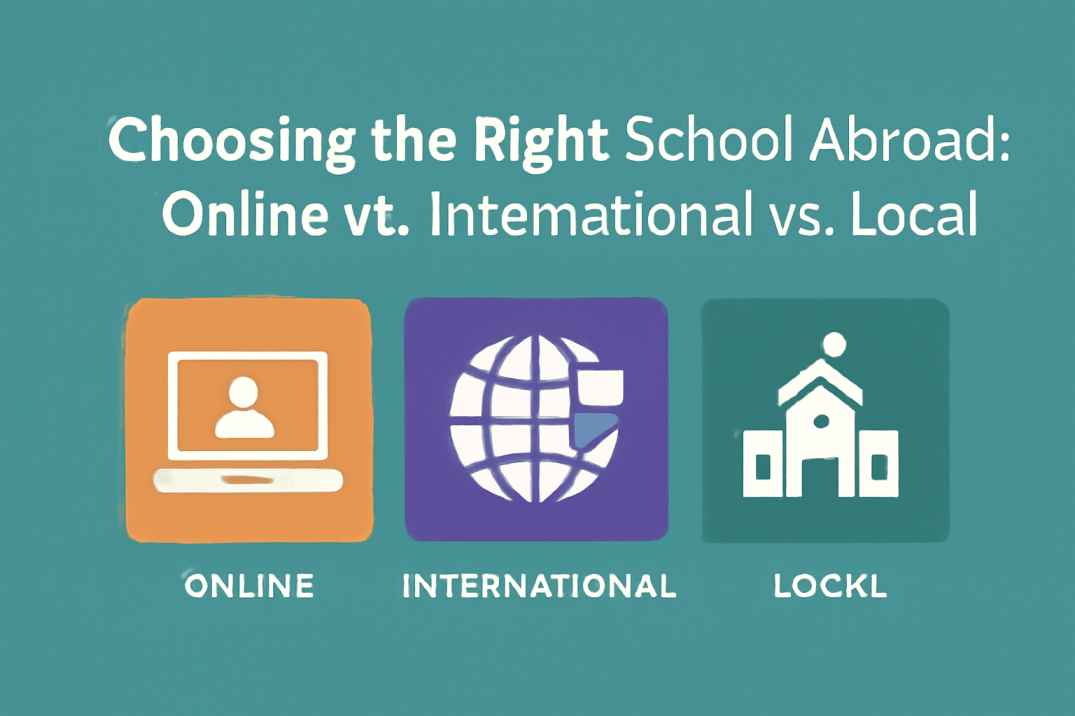
When relocating to a new country, one of the most important decisions expat parents face is choosing the right school for their children. With the rise of online education, the availability of international schools, and the option to enroll in local institutions, the choices can be overwhelming. In this blog, we will explore the pros and cons of online, international, and local schools to help you make the best decision for your child.
1. Online Schools: The Flexible Option
-
Benefits of Online Schools
-
Flexibility: Online schools offer the ability to study from anywhere, which is ideal for families that travel frequently or move often.
-
Customizable Learning: Many online schools allow students to progress at their own pace, offering a more personalized education experience.
-
Access to Global Resources: Online education platforms often provide access to international curricula, language options, and extracurricular activities.
-
-
Challenges of Online Schools
-
Limited Social Interaction: Online schools lack in-person interaction, which can impact the development of social skills.
-
Technological Issues: Reliable internet and suitable technology are required to make online schooling effective.
-
2. International Schools: The Expat-Friendly Choice
-
Benefits of International Schools
-
Familiar Curriculum: International schools often offer curricula from home countries (e.g., British, American, or International Baccalaureate), making the transition easier for expat children.
-
Cultural Diversity: These schools tend to have diverse student populations, allowing children to meet peers from various backgrounds.
-
Language Support: Many international schools offer bilingual or multilingual education, helping students adjust to a new country’s language.
-
-
Challenges of International Schools
-
Cost: International schools can be expensive, with high tuition fees and additional costs for extracurricular activities.
-
Limited Local Integration: Children attending international schools may not integrate fully into the local culture or language.
-
3. Local Schools: The Cultural Immersion Experience
-
Benefits of Local Schools
-
Cultural Integration: Enrolling in a local school helps children immerse themselves in the culture and language of the host country, fostering a deeper connection.
-
Lower Costs: Local schools are typically more affordable than international schools, making them a budget-friendly option for families.
-
Long-Term Benefits: Learning the local language and culture can be beneficial in the long term, especially if you plan to stay in the country for a longer period.
-
-
Challenges of Local Schools
-
Language Barriers: Non-native speakers may struggle to keep up with lessons, especially in countries where the primary language is different from your own.
-
Curriculum Differences: Local schools may not offer the same international curricula or global perspective that expat children are accustomed to.
-
4. How to Choose the Best Option
-
Consider Your Family’s Needs
-
Evaluate how long you plan to stay in the country and whether your child will benefit from cultural immersion or if a more familiar curriculum is necessary.
-
-
Assess Educational Standards
-
Research the quality of education provided by each option, looking into the reputation of online platforms, international schools, and local schools.
-
-
Think About Logistics
-
Consider factors such as location, affordability, language barriers, and the availability of extracurricular activities.
-
Conclusion
Choosing the right school abroad is a decision that depends on your family’s unique needs and circumstances. Whether you opt for online, international, or local schooling, each option offers distinct advantages. By weighing the benefits and challenges, you can make an informed decision that will provide the best education and experience for your child.


